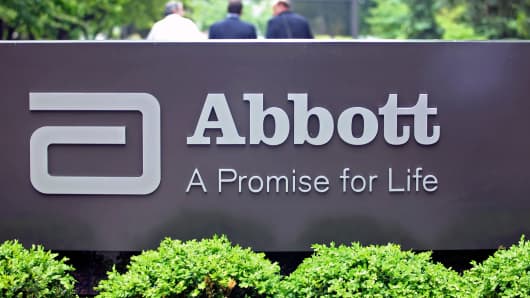In a recent Bloomberg News story I learned that ABBV will "...seek treatments for unmet medical needs in a push to grow sales in 2015," according to the company's new chief financial officer.
"The competition is less keen to find drugs for conditions with few current therapies than for primary care," CFO William Chase told Bloomberg Thursday in an interview in New York. "AbbVie will focus on these illnesses, such as Parkinson's and endometriosis, a disease of the uterus, where the North Chicago, Ill.-based company already has treatments under development," he said.
That's the apparent good news about AbbVie. The not-so-great news came later in the interview with the CFO.
"We're not going to be a primary care company going forward," Chase said. "What we're really looking for is specialty segments."
"The goal is for those products to come on line in 2015," Chase said. "In 2015, the pipeline will kick in and at which point we're confident AbbVie will return to growth," Chase said.
My stars, that's two years from now! Maybe we can buy shares between now and then at around $27, almost 20 percent below the opening day high.
Let me commend Chase and AbbVie for disclosing that it'll be two years or more before the "return to growth." If AbbVie adds even more promising blockbuster drug treatments to its product pipeline, it may become a lucrative, high-performance company. Then its stock price is likely to rise well before 2015.
In the meantime, and until further notice, let's take the CFO at his word: "Until then [2015] sales likely will be little changed. The company will lose about $2.5 billion of what it projects will be $18 billion in 2013 revenue as patents expire, Chase said. The sales loss will be offset by more revenue from Humira and Androgel, a testosterone product."
Most large-cap stocks were once small- and mid-cap stocks. Bryan Ashenberg is here to help you find the cream of the crop amongst the market chaos.
Now let's consider Abbott and what it has to offer investors going forward. Abbott is still a diversified health-care company with a market cap of more than $52 billion. Its performance goals are focused across a broad portfolio of leading businesses aligned with favorable long-term healthcare and emerging market trends.
Financially, Abbott intends to generate "top-tier growth," as explained in the investor relations section of its fascinating Web site, which speaks of "... expanding margins and strong cash flow."
Abbott's sales are diversified throughout the world, with 30 percent of sales in the United States, 30 percent from other developed markets (Canada, Western Europe, Japan, and Australia) and 40 percent in emerging markets such as India, China, Russia and Brazil.
Its "A-to-Z" list of products, from animal health to nutrition bars called "Zone Perfect" can also be found at the Web site referenced above. On Thursday the U.S. Food and Drug Administration approved Abbott's Xience Xpedition coronary stent system. This allows the company to begin selling it immediately in all 50 states.
The Abbott Park, Ill., company said in a prepared statement the new coronary stent system provides "physicians with a next generation technology with the largest size matrix in the U.S. market." Perhaps that approval and the very successful spin-off of ABBV helps account for the almost 4 percent jump in Abbott's share price on Thursday, when the market averages were mainly down.
"The launch of Xience Xpedition in the United States will advance Abbott's worldwide market-leading position in drug eluting stents," said John Capek, Abbott's executive vice president of medical devices.
It's important to note that Xience Xpedition is already sold in Europe, the Middle East and parts of Asia. The first physician to implant a patient with the newly approved coronary stent system in the U.S. was quoted in the Chicago Business Journal as saying, "The impact of the changes to the stent delivery system is particularly notable in patients with complex coronary anatomy."
The physician, Dr. Samin Sharma, is director of Clinical and Interventional Cardiology, dean of International Clinical Affiliations, and president of the Mount Sinai Heart Network, at Mount Sinai Medical Center in New York.
Dr. Sharma explained further, "For these patients, physicians have a new technology to reach the blockage and restore blood flow with ease and confidence." For Abbott that's the kind of endorsement that money just can't buy and should help make the sales of the new coronary stent system a significant new addition to the company's cash flow.
Abbott will report quarterly earnings and no doubt comment on its dividend on Jan. 21.
Let me close with a five-year chart that speaks volumes about Abbott's success both as a company and as a diversified provider of many far-reaching health-care and medical products. Its free cash flow yield and its remarkable increase in quarterly income from continuing operations is nothing less than impressive.
Yours truly will continue to accumulate shares of Abbott on pullbacks. The 200-day moving average price per share is around 7 percent below Thursday's closing price of $33.27. Don't chase this stock, and if you own it I'd recommend you use a stealth trailing stop loss system that will alert you when the price of ABT shares reaches your chosen buy-limit price.
—By TheStreet.com Contributor Marc Courtenay
Additional News: How 'Cliff' Deal Impacts Health Care Stocks
Additional Views: 13 Biotech Stock Predictions for 2013
___________________________
Disclosures:
At the time of publication the author had a position in Abbott Laboratories.
___________________________
Disclaimer


